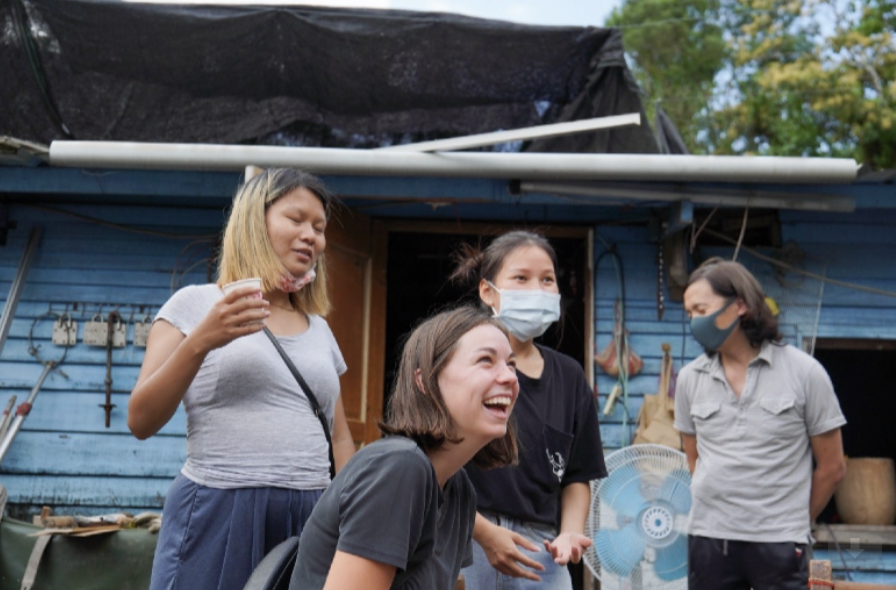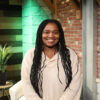When Mackenzie Miller answers the video call in Taiwan, she comments on the weather. The sun is shining. In Taiwan, during the typhoon season, that’s news worth sharing.
“Riding my bike is a struggle,” she said. “We have typhoons here. [But] it’s been great.”Striking a balance given the 13-hour time difference with Indiana, Miller pauses for an interview before attending a 9:00 a.m. class at National Dong Hwa University in Hualien, Taiwan.
In 2021, Miller graduated from Goshen College with a bachelor’s degree in journalism and English. This year, in September, she got on a plane to Taiwan as a grantee for the Fulbright U.S Student Program Scholarship.
The U.S. Department of State’s Educational and Cultural Affairs Bureau runs the program. Their mission emphasizes understanding between the people of the United States and other countries.
“In the last 20 years, we have only had two other Fulbright students,” said Jan Bender Shetler, director of global engagement. Miller began to think about the Fulbright in her final year at Goshen. “I would randomly search to see what programs Fulbright offered. I enjoy dreaming about the future — this was one tangible way to do that.”
After graduating from GC, Miller arrived in Washington, D.C., to intern at the U.S Institute of Peace while working at a Chinese charter school. “There were lots of thoughts and days spent daydreaming when I first moved to D.C., and the Fulbright application soon became my new project,” Miller wrote in her blog.
“I spent hours each day researching Taiwan, writing essays and contacting past professors for references and future professors for guidance.”
She began the application in July of 2021 and worked on it until October. While the process was lengthy, Miller explained, it was a fun contrast, having been accustomed to the fast-paced world of journalism.
“You write a paper; someone edits it and then it’s published,” she said. “In academia, you have to tweak and work on [essays] for a long time.”
After the application was submitted, Miller resumed her life in D.C. The news eventually came that she was a semi-finalist and then an alternate for the Fulbright program.
“Being selected as an alternate felt like the worst option,” she said. “I had waited five months because the process is so drawn out. By being an alternate, you have to wait even longer.” Miller continued her life until an email arrived revealing her promotion to grantee status. She was excited and shocked because “reality changed so quickly.”
Applicants receive six weeks to commit to the program if accepted. Since Miller was an alternate, she had 10 days to decide. She weighed questions like: “Am I interested because it’s prestigious or because I want to do the program?”
“I was worried that even if there was an ounce of desire to do it for the prestige, I was doing it for the wrong reasons,” she said. Miller concluded that she has “things to offer the world” and a “seat at the table too.”
People in her life noted the significance of receiving this award after graduating from a small college in Indiana. She credits family members as an integral part of her decision- making. Miller is also thankful to the president at Hesston College, her alma mater, Joe Manickam, and a Washington Post reporter and mentor, James Rupert, “who, while sipping horchata, pulled out a napkin and wrote out the pros and cons.”
She met Rupert during her internship in D.C., saying she wanted “to pick his brain about other things related to journalism and we happened to talk about Fulbright.”
“I was overwhelmed by the gift of people and the clarity that I needed to say, yes, I will go,” she said. “I still return to those 10 days now when reassurance is needed.” Upon arriving in the capital of Taiwan, Miller quarantined for seven days. She then moved to Hualien but returned to lockdown a week later when one of her roommates tested positive for COVID-19. Miller left isolation to begin classes and is currently in her preparatory year of language study.
She will move into her degree coursework in August 2023. Her initial research interest, which she touched upon in her Fulbright application, was to show how Mandarin Chinese impacts indigenous languages throughout Taiwan.
Miller had studied Mandarin for eight years, explaining, “[People] are taught the standard form of Chinese, so I wanted to see how that affects or silences indigenous language preservation.”
As she spends more time in Taiwan, her interests are changing, especially when visiting indigenous villages. Miller is exploring several research options as she meets new people and audits courses, such as the presence of indigenous news publications on the island.
“I feel like my goals have already changed, perhaps even relaxed a little, especially as I learn about myself and what it means to be an adult,” she said. “My research will definitely have to do with anthropology,” she added. “Hopefully, I’ll gain clarity by the end of the year.”
Miller also spoke about living in China for 10 months and how it prepped her for Taiwan.
“It feels like there is less of a desire to romanticize the unknown this time around,” she said. “I know what it’s like to be abroad, and it’s not fun … all the time.”
“That’s the theme I learned in China and I’m trying to remember every day here — that it’ll be worth it.”
She is adjusting to life in Taiwan and loves the small city: “It’s more nature-based here. There’s mountains and oceans.”
Miller also explained how adjusting to life abroad cannot be rushed, for example, in making new friends.
“They separate … local students with the international students, so you’re living in your world and have to be intentional about making friends. It’s a slow process and I’m not patient.”
“I practice mindfulness when I can,” she added. “It sounds glamorous, but it’s me waking up eating a banana with peanut butter and listening to a guy tell me to accept my reality.”
Two years ago, when she was a senior at GC, Miller wrote in her iPhone notes “Dreams for The
Future:”
• Never stop asking questions about the world
• Continue engaging with those who are different
• Write a book
She said that recalling her “why” keeps her going, saying, “I want to keep learning every time I have the opportunity to or when I get excited about a conversation … it gives me life.”
“Every week, I bike to my regular stand to buy bubble tea from my friend. We chat in Chinese, and that makes me smile. These relationships keep me going.”
After the program, Miller has many thoughts about where she will land — journalism, traveling broad to work or using her anthropology degree as a “springboard for something different.”
“I’m more OK with the idea of following one’s own path and allowing it to curve and reroute, not always following a straight trajectory,” she said.
As for the book?
“I would love to write a book, but I wouldn’t say I’m committed to that goal yet … maybe later in life.”




